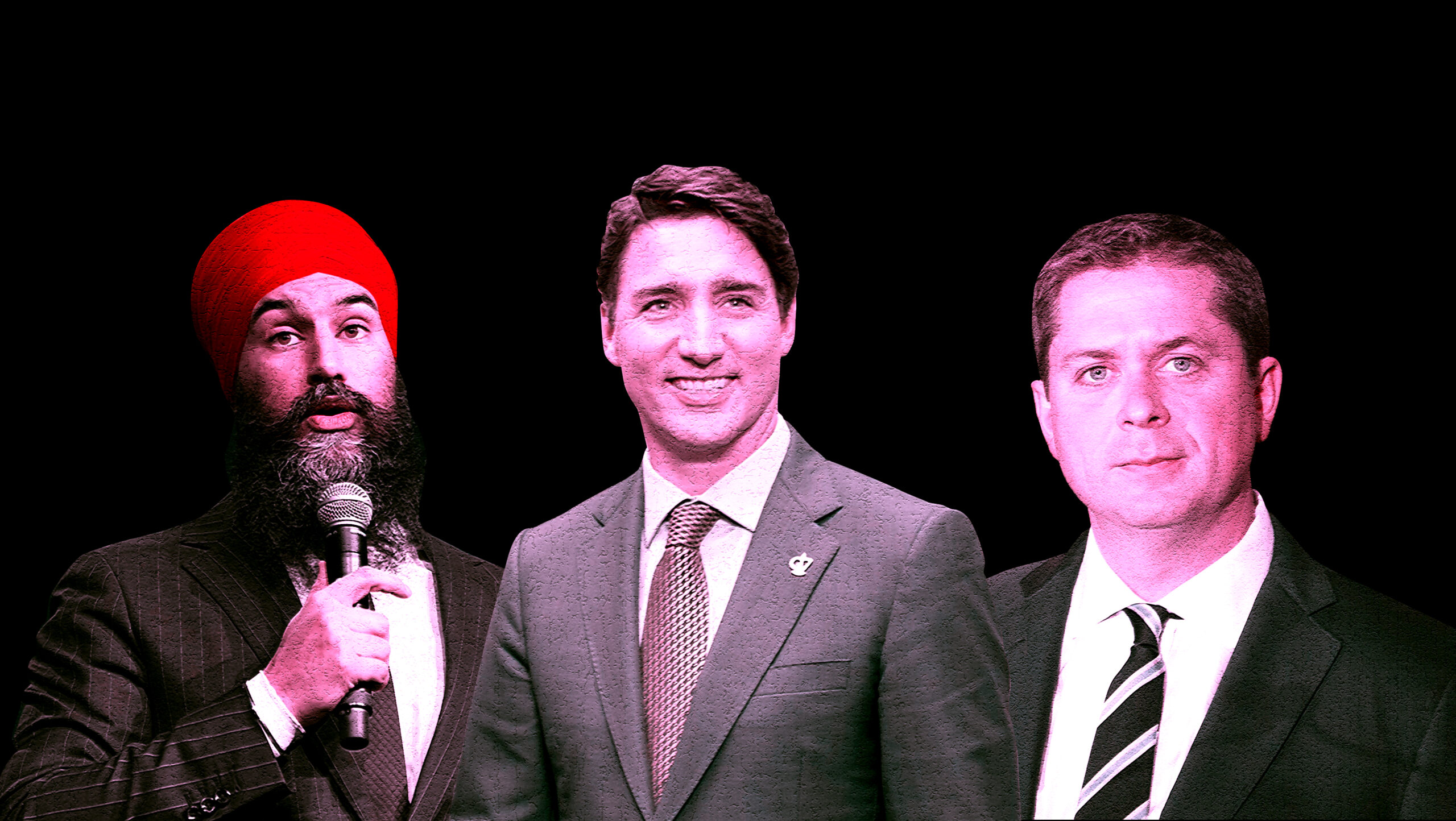This story is part of Rainbow Votes 2019, special Canadian election newsletter by Xtra. You can sign up here to receive the newsletter directly in your inbox, every Tuesday.
UPDATE: This week, community-organized town halls on LGBTQ2 issues took place across the country. There, candidates from all four major parties—the Liberal Party, Conservative Party, NDP and Green Party—addressed several of the questions we outlined below. You can read more about these town halls and how candidates responded here and watch a video of the Toronto town hall here.
Since the publication of this story, Xtra received responses to these questions from a Liberal Party spokesperson. The party has not made leader Justin Trudeau available for an interview with us.
We’re less than two weeks away from election day and I don’t know about you, but I’m exhausted. For an election campaign that contained very little actual substance on LGBTQ2 issues, we sure did hear about gay people a lot.
But don’t be mistaken: Leaders haven’t suddenly taken up our communities’ causes, rallying their parties to improve the rights of transgender Canadians or protect LGBTQ2 refugees or end the ongoing criminalization of queer and trans people in this country.
Instead of looking forward, politicians have reached backward. We’ve watched the Liberal Party dredge up Conservative leader Andrew Scheer’s comments from a 2005 House of Commons speech on gay marriage. That’s meant for the past month, everyone has wanted to hear Scheer’s thoughts on marriage equality—reporters demand answers in scrums while fellow party leaders bring it up in true gotcha’ spirit, hoping to trip him up on the podium.
Meanwhile, the Liberal Party says it’ll amend the Criminal Code to ban conversion therapy if re-elected—a move it could have accomplished in January while it was governing. That spurred reporters to question Scheer for his take on the practice.
And let’s not forget Pride, the supposed litmus test on just how queer-friendly leaders are. Whether or not Scheer would march in a Pride parade became the subject of debate early on in the election campaign, as though the most pressing concern for LGBTQ2 people is whether the Conservative leader waves to a crowd of partygoers and gets sprayed with a Super Soaker.
It’s great that our communities are visible, at least, but in 2019 these simple nods to our issues feel shallow at best. If we’re being honest, who does or doesn’t come to Pride or what someone said about gay marriage in 2005 doesn’t matter when our communities remain vulnerable, at-risk and criminalized right now. There are bigger questions leaders need to answer, and more pressing issues parties need to be held accountable for.
Xtra has been trying to do just that. Since the start of the campaign, we have reached out multiple times to the Liberals, Conservatives, NDP and Greens with requests to interview their leaders. We want to ask the questions that our communities care about—questions that reporters who don’t belong to our communities haven’t thought to ask. As an LGBTQ2 publication that focuses on these issues all the time (not just during elections) we have a greater depth of knowledge and credibility. That’s not a knock on other political journalists, but rather an acknowledgment that a more diverse and representative media pool (of LGBTQ reporters, BIPOC reporters, reporters with disabilities) leads to smarter and more thoughtful questions, and a higher degree of accountability.
But, with the exception of the Green Party, we’ve been met with silence. Some parties made us jump through hoops only to stop returning our calls and emails; others ignored our requests entirely.
If leaders are willing to use our communities as talking points on the campaign trail, they should be able to answer questions about the ways they’ll support us in the coming four years. After all, waving in a Pride parade is just a photo-op, not a sign of a substantial commitment to us and our concerns.
In the coming days, town halls will be held across the country featuring candidates from all major parties. Our team at Xtra, which is a media sponsor for the Proud to Vote national town halls, will be attending the first event in Toronto tonight, where editorial director Rachel Giese will moderate. For the first time this campaign, people from our communities—both spokespeople from LGBTQ2 organizations and individuals—will put their questions to candidates.
It’s a start. But party leaders must be held accountable, too. Leaders: We have questions. And if we had the chance, here’s what we’d ask:
Since 1992, men who have sex with men (MSM) have been unable to donate blood without limitations. Currently, Canadian Blood Services has allowed men who have not had sexual contact with another man in three months to donate. Does your party intend to end the blood ban altogether? If so, how soon would you put this in place?
In 2015, the Canadian Psychological Association denounced the practice of conversion therapy, saying that it can result in damaging outcomes for LGBTQ2 individuals such as depression, negative self-image and a feeling of personal failure. If elected, would your government work to ban conversion therapy on a national scale?
Refugees who flee homophobic or transphobic violence risk their lives during migration. Measures like the Safe Third Country Agreement force LGBTQ2 refugees to take extreme risks to try to reach safety in Canada. But even when they get here, they continue to struggle to access safe shelter and support. What will your party do to uphold the right to seek asylum for LGBTQ2 refugees, make migration and settlement safer and make sure that LGBTQ2 refugees have access to safe shelter and legal and social supports across the country?
People living with HIV can still be prosecuted for aggravated sexual assault if they don’t disclose their HIV status to sexual partners. This can happen even in cases where there was little or no risk of transmitting HIV. Under the law, a person engaging in consensual sex that causes no harm can be treated like a violent rapist. Approximately 200 people across Canada have already been charged. Will your party support reforms to the Criminal Code that remove HIV non-disclosure from the law associated with sexual assault? And will your party support reforms to limit any prosecutions to cases of intentional and actual transmission of HIV?
Constant oppression is a reality for trans folks, especially trans women, non-binary and Two-Spirit people, even when accessing services that are, according to the charter, a basic right for all humans. While healthcare in many cases is covered by provincial jurisdictions—the exception being for Two-Spirit, queer and trans Indigenous people who receive federally-administered healthcare services on their reserves— there are things that the federal government can do to support trans, non-binary and Two-Spirit folks on their journeys, including standardizing care and access to care from a human rights perspective. How do you and your party intend to support trans folk, and especially trans women, non-binary and Two-Spirit people, in accessing life-saving surgery, medication and procedures if you are elected?
In its final report, the National Inquiry into Missing and Murdered Indigenous Women and Girls specifically acknowledged the violence experienced by Two-spirit, queer, trans and non-binary Indigenous people. What will your government do to implement the recommendations set out in the final report and to ensure the safety and wellbeing of Indigenous girls, women, trans, Two-Spirit, gay, lesbian, queer and non-binary people?
Many Prides across the country have asked that police and military groups not participate in uniform at their events, citing the past history of police brutality in our communities as well as ongoing, current concerns about racial profiling and police racism and the mishandling of investigations, like the Bruce McArthur case. While most police services are administered municipally and provincially, what kind of leadership role can the federal government take in ensuring they are free of bias and responsive to the communities they serve?
For the first time ever, millennials make up the largest voting bloc in Canada. What do you think are the most pressing issues facing this group and what will you do to make the futures of LGBTQ2 youth and young adults safer and brighter?
Until we get a straight answer (no pun intended) from our leaders, feel free to catch our livestream of the first Proud to Vote event in Toronto tonight at 7 p.m. ET.


 Why you can trust Xtra
Why you can trust Xtra


